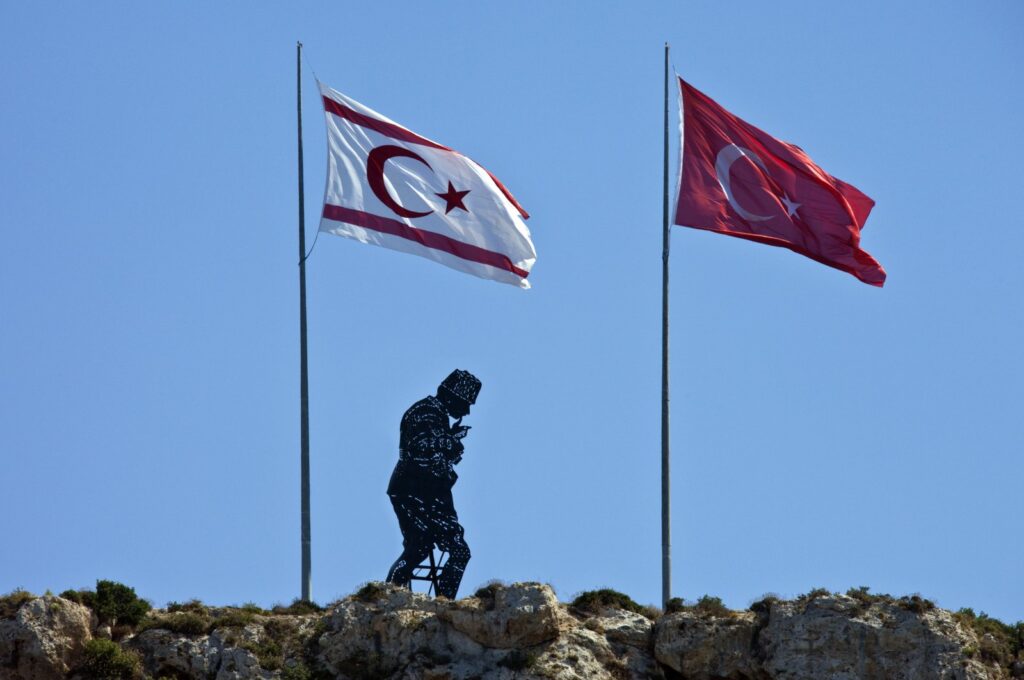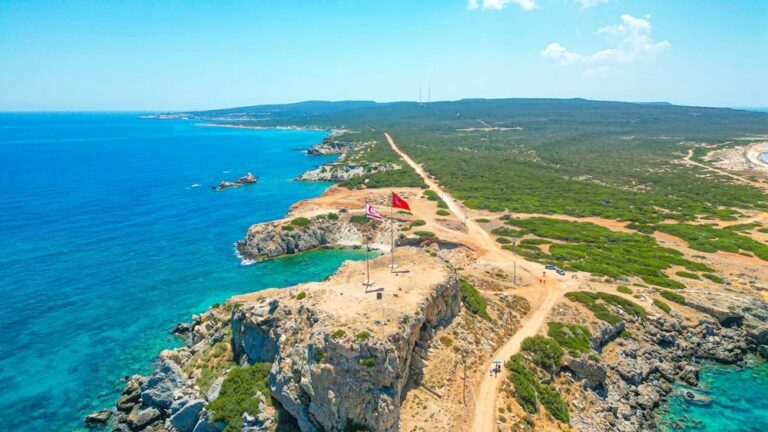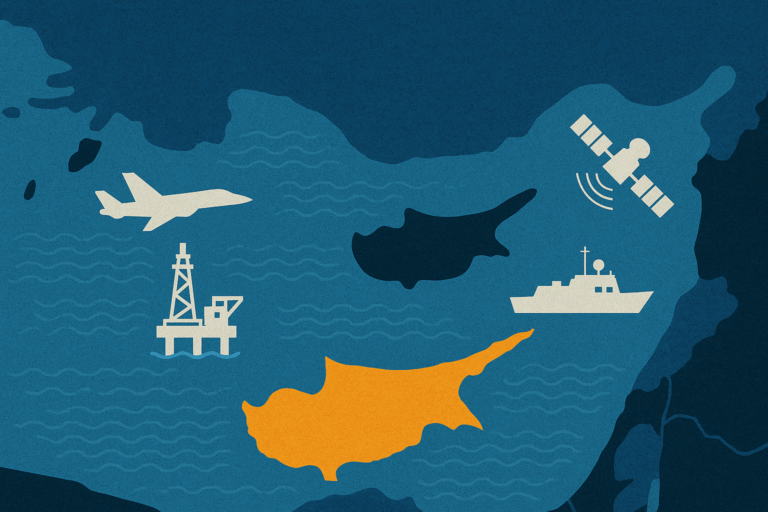The Eastern Mediterranean has long been a hot spot of geopolitical tension, with the Israeli-Palestinian conflict, the Cyprus issue and the corresponding gas dispute adding complexity to the region. Recently, the influence of Zionism in the Turkish Republic of Northern Cyprus (TRNC) has become a topic of concern, raising questions about strategic priorities and possible future scenarios. Understanding Israel’s current interests in Turkish Cyprus requires delving into its historical context and examining recent developments that are reshaping the island’s geopolitical landscape.
Cyprus as option
The idea of Cyprus as a potential homeland for the Jewish people was considered by early Zionist leaders. During the late 19th and early 20th centuries, as the Zionist movement sought refuge for Jews facing persecution, Cyprus was proposed as an alternative site for the establishment of a Jewish homeland. Its geographical proximity to the historical core of Judaism, relatively fertile land and the potential for fewer conflicts made it an appealing option. During early Zionist congresses, some Jewish leaders advocated for the island as a potential location for Jewish settlement. However, Theodor Herzl, the father of modern political Zionism, ultimately rejected Cyprus in favor of Palestine, emphasizing the historical and spiritual connection to the land of Israel.
Even though Cyprus was not chosen as the Jewish homeland, the island maintained a strategic significance for Zionist leaders. During the British Mandate period in Palestine, Cyprus was used as a detention site for Jewish refugees attempting to enter Palestine illegally, adding another layer to the historical connection between Zionism and Cyprus. These historical ties have persisted into modern times, as Israel views Cyprus as a strategic asset in the Eastern Mediterranean.
Suspicious interest in TRNC
In recent years, Turkish Cyprus has become a popular destination for Israeli tourists, drawn to the TRNC’s relatively unspoiled beaches, historical sites and casinos, which are illegal in Israel. The influx of Israeli tourists has transformed parts of the country into a thriving tourism hot spot, with visitors contributing significantly to the local economy. This burgeoning relationship, however, goes beyond mere tourism.
Israeli individuals and corporations have been increasingly investing in the real estate market of the TRNC, with a particular focus on the Iskele region, which is in close proximity to Israel. There has been a noticeable increase in the purchase of land and properties by Jewish investors, with some even establishing their own housing projects and neighborhoods. This trend has raised concerns in the TRNC, as it mirrors the historical methods of land acquisition and settlement that played a crucial role in the establishment of Israel. In response, the TRNC has implemented legal changes to restrict the ease with which foreigners, including Israelis, can acquire property and build communities.
Under the new laws, foreign individuals are limited to purchasing land up to a certain number of square meters and may own only one apartment or house. The process now requires a formal application to the corresponding ministry, and the sale must be registered with the local land registry office within six months. This measure ensures that legal and security checks are completed before the property is transferred, as foreign buyers must also undergo a thorough security investigation now. The Council of Ministers has the authority to approve or reject these applications, highlighting the government’s cautious stance on foreign land ownership. However, purchases made prior to these legislative changes are not affected by them, nor are naturalized foreigners, for instance.
De facto occupation
Still, the growing Israeli presence in Turkish Cyprus has led to speculation about the long-term strategic intentions behind these investments. Some analysts and local residents fear a gradual attempt at establishing a stronger foothold. Given the TRNC’s unclear international status and strategic location in the Eastern Mediterranean, such concerns are not unfounded.
Legal changes in the TRNC to curb foreign property ownership reflect a recognition of potential risks. There is fear that the situation could evolve into a de facto occupation, drawing parallels with Israel’s settlement expansion in the Palestinian territories. The notion that some Jewish groups today consider Northern Cyprus as part of a broader “promised land” fuels these concerns.
Furthermore, the recent genocide in Gaza underscores the lengths to which Israel may go in pursuing its interests. Additionally, Israel’s broader foreign policy, which includes military actions against other sovereign nations, raises further concerns about Northern Cyprus. Its military actions against countries such as Syria and Lebanon illustrate a readiness to use force to secure strategic goals.
Moreover, Turkish Cyprus is considered energy-rich following the discovery of natural gas reserves beneath the seabed in the region. This resource potential could incentivize Israel to involve itself further in the TRNC, as it could not only boost Israel’s natural gas reserves but also strengthen its regional independence.
Military, security
In addition to these concerns, Israel’s growing interest in Cyprus has a significant military and security component. Cyprus’ location offers strategic advantages for surveillance, reconnaissance and potential military operations in the Eastern Mediterranean. This strategic value is not new; it is the reason why the British Empire annexed the island from the Ottoman Empire over a century ago and still maintains two military bases there today. As Israel fortifies its regional security architecture, Cyprus could be an outpost to project power and monitor regional developments.
Thus, Israel has lately intensified its military cooperation with the Greek Cypriot administration in the island’s south, a move seen by many as an effort to counterbalance Türkiye’s regional influence. This cooperation includes both naval and air exercises conducted by Israel over Cyprus and off the Cypriot coast. For instance, Israeli forces have used Cypriot airports for drills and have also held naval exercises in the region involving other countries like Greece, France and the U.S. Importantly, in previous weeks, the U.S. and British militaries have been increasingly positioning military units in the southern part of the island, aiming to bolster support for Israel and enhance strategic readiness in the region. As such, the current developments also risk drawing the island into the broader Arab-Israeli conflict, a concern that has been recently underscored by Hezbollah.
Either way, the ongoing military cooperation could foreshadow more assertive military posturing in the region, for example, if tensions with Türkiye escalate or if Israel seeks to safeguard its growing interests in Turkish Cyprus.
Türkiye’s stand
Ankara, as the main supporter of the TRNC and an advocate for Palestinian rights, views Israeli activities in Cyprus, especially in the north, and those of their allies with growing suspicion. Notably, Israel’s influence in the region, along with that of its closest ally, the U.S., is not a new concern for Türkiye. The Netanyahu administration, backed by Washington, has long supported the objectives of the PKK terrorist organization to establish an alleged Kurdish state in the region, an area which, according to some perspectives, is also considered part of the “promised lands.”
Experts view a potential Kurdish state as an intermediate step toward the occupation of these territories. Just as Türkiye is resolutely combating the PKK and Israeli ambitions, the establishment of Israeli communities, military activities and strategic interests in Cyprus may prompt a reaction from Türkiye, potentially leading to increased regional friction and affecting the delicate balance of power in the Eastern Mediterranean. This adds complexity to the situation, raising the stakes for all involved parties.
In summary, the situation in Turkish Cyprus reflects the ongoing Zionist-driven geopolitical tensions in the region, where strategic interests intersect with historical grievances. This underscores the need for vigilance in addressing the evolving dynamics in Turkish Cyprus.




